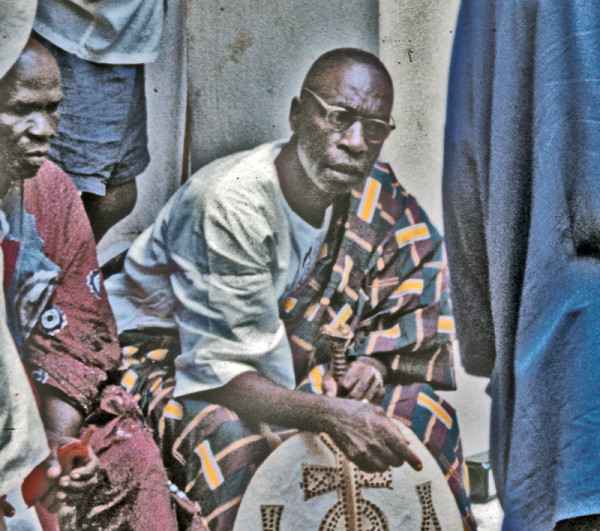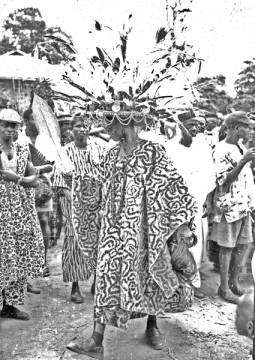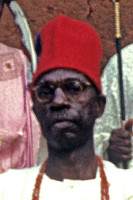(Above: Odu Mbanefo II discussing process at the funeral of Obi Okosi II, March 19, 1961)
[Note: a version of this essay was first presented to a gathering of anthropologists at Wellesley College in 1992.]
[Note: Click on any image you may want to enlarge.]
When I came to Onitsha in 1960 I was a fairly mainstream social-science “modernist” in Anthropology, and my experiences there largely sustained my perception that “modernization” was indeed progressing in that remarkable city, despite the presence of its titled chiefs, the more “traditionalist” of whom seemed to me to be bent on imposing their own wishes on an educated community who were striving to incorporate more “democratic” procedures into their selection of a successor to their kingship. In 1961 to 1962, I witnessed what I then tended to construe as a “victory” of democratization and a defeat of those “traditionalist chiefs” seeking to perpetuate their authoritarian rule. This corroborated my own social-scientific models of “modernization theory”. (I write these pages in 1992, somewhat embarrassed by the extremity of this personal bias I have to recall here, though to be fair I tried to counterbalance it in the ethnographies I wrote during the following years.)
Still, when I continued to write about this interregnum during the years following 1962, dark shadows of disturbing local, regional, national, and global contexts “hung over” my optimistic vision, and stalled the progress of my pen. Today we all know more or less the disaster that happened, a process that began well before 1962 in Nigeria for anyone with eyes to see it, but as one who had tended to see an emerging “progress” there it was a shock for me to witness the vicious ethnic cleansing, coups and counter-coups, the decline into authoritarian rule that followed in the 1970s.
While I was there in the 1960s, Onitsha “chiefs” (ndichie) were expected to epitomize the tendencies just described, for example in every public dance where they performed, Indeed, wherever they appeared in public they were seen by knowledgeable participants in the culture as radiating a kind of malevolent power before which ordinary people would retreat (though both chiefs and commoners displayed these charismatic qualities on ceremonial occasions with such profound ambiguity that an outsider might think the interactions were filled with delight on all sides, as indeed they were). The presence of (somewhat subdued) malevolence was combined with (more obvious) evidence of delight.
I found this political theme — politics as inherently, if somewhat subversively, a contest of invisible killing — pervasive in 1961-62, one major voice of Onitsha power, a model of power relations which I will here label a cultural “paranoia”. By that I mean a model of politics as a war of each against all, of greater against smaller, an opposition of “predators-and-prey”, which was seen to operate pervasively “in camera” despite the theatrically apparent good humor portrayed by the leading participants and the enthusiastic admiration toward them expressed by their followers. I found these paranoid stances personally most distasteful, and in fact I tried to limit my contacts with those who most strongly represented them, bracketing them as “traditional” leaders and followers, whose paranoid visions (as I saw them) would eventually be replaced by the “greater social understandings” of “modern social science”, as this authoritarian model gave way to more Westernized forms of social interaction. (This pattern of avoidance produced some very significant limitations for my research, but I will not pursue that aspect of the subject in any further detail here.)
Let me give you an example of my relations with Onitsha chiefs in 1960-62: my experiences with the Odu (his title as the third·most Senior Chief in Onitsha), whose family name was Mbanefo. While we were in Onitsha in 1960·62, Odu Mbanefo reached his middle sixties. He had lived there most of his life, attaining great affluence, and had helped his family become one of the most prominent in all Onitsha, indeed in all Nigeria. Highly accomplished in both traditional and modern pursuits, he was in Onitsha for that very reason also widely feared — one anxious confidant told me he was “well-known as a Master of the Black Arts”, and it was also widely rumored that his family had some “genealogical problems” that made them alternate between defensive closures and offensive assertiveness vis-a-vis others.
I first met him early in our stay, in 1960, unfortunately in the company of a man who failed to instruct me about the appropriate etiquette for meeting chiefs. Most embarrassing in retrospect was my offering him my hand for a handshake (only later to learn that chiefs traditionally were not supposed to touch ordinary Onitsha people, much less “foreigners” like myself). He proffered the hand, but it felt like a cold slab, his gaze was narrow and remote, and I sensed myself “in error”. He gave accurate information, but volunteered nothing, and I sensed critical scrutiny of my every move. Eventually, he became part of what I eventually called the “hierarchic-traditional faction” of the Interregnum of 1961-62, and — since the “hierarchic” faction emphasized secret operations — our relationship became even more remote.
The last time I visited him in 1961, he warned me, in clear and unsmiling terms, that if I wrote “untruths” about Onitsha people, he and his people would take me to court. Since his junior brother, the first Igbo-speaking man to have become a qualified lawyer in colonial Nigeria, was by then Attorney General of Eastern Nigeria, I regarded the Odu‘s threat with some fear, and as the years passed and I wrote various articles and books about Onitsha, though I tried to be careful not to write anything I thought would offend him. I mailed him a copy of my 1972 book, but received no reply, and — partly because my book had emphasized certain “hidden” aspects of Onitsha people which might appear to fit his family, perhaps to their expense in terms of prestige — I experienced a gnawing fear of ever placing myself within his reach again.
During the years from 1962, when we departed from Onitsha, newly-independent Nigeria, which had been programmed for chaos from its very beginning by the colonial powers, was already sliding with accelerating momentum toward the ultimate catastrophes of military coups followed by the Biafra war, when most Onitsha people were forced to abandon their homes and experienced, along with most Igbo-speaking people, “very hard times”. During, and then after the war, the Onitsha chiefs regained some of their hierarchical control within the town, and some of the innovative democratic institutions I had witnessed in 1961-62 disappeared. (For example, the once-radical leader of Nigerian nationalism Nnamdi Azikiwe ended his career as an Onitsha Senior Chief — Ndichie-Ume, the same level as the Odu but considerably beneath him in rank.)
My own experience during the war and its aftermath was also rather chaotic and self-transforming. At the outset of the Biafran secession, I wrote a letter to the New York Times protesting what we would now call the “ethnic cleansing” of the Igbo in Nigeria, and the Nigerian government’s failure to show good faith in redressing these pogroms. As proponents of the Igbo point of view during the slide into warfare, Helen and I met and became friends with Anne-Marie Shimony, a bond which grew from our various efforts at that time, has persisted over these thirty years, and is how we are privileged to be here at Wellesley honoring her today. But this letter to the Times, and our subsequent efforts on behalf of Biafran “relief”, earned me the enmity of the Nigerian government for some years thereafter (we understood we had been placed on an “Airport List” of those who were unwelcome), and after the war, when Helen and I moved to Arizona, we drifted away from West African affairs for some years. In the late 1980s, following changes in Nigerian governments, we decided to begin preparing to return.
But in 1992 I found myself somewhat afraid to return, as I learned that, among the Onitsha Senior Chiefs I had known in 1961-62, the Odu was one of only two who still survived — the chiefs who had supported the democratic faction had all since died. So as we made our plans to return, I found the image of the Odu looming large as a hostile, powerfully authoritarian presence, and I confess with chagrin that once or twice I fantasized that he too might soon conveniently die, sparing me my growing fears about placing myself vulnerably within his domains.
When Helen and I finally did return to Onitsha in June of 1992, many of the people I met were behaving in even more paranoid fashion than before (for good reason, it seemed, as the entire city was vastly more dangerous than it had been in 1962), and some of our hosts feared not only to accommodate us in their homes, but to speak openly about our travels about the town, lest sorcery strike both us and them, or local gangsters come to rob us all. And soon I learned that, yes, the Odu was still alive and thriving ·· now 95 years old, apparently still at the height of his powers. I privately cringed at the thought of approaching him, and fell into worried fantasies: what would I do if he offered me food or drink, since like all chiefs he must be skilled in the use of poisons, and might hold grudges about what I had said in my writings?
Still, I had a moral duty to confront him as one of the last prominent figures surviving from the ’60s, and so one bright Onitsha day, in June of 1992, I was driven by Francis Omekam to the Odu‘s house, accompanied by Peter Maduegbuna (late Byron Maduegbuna’s older brother, and a Freemasonry lodge-mate of the Odu, who had arranged our meeting) and carrying the requisite bottle of “hot drink” to present him (for as the Onitsha proverb says, “one does not approach a chief empty-handed”).
Soon after we were seated, Odu Mbanefo entered his courtroom with a long-legged stride, bareheaded, tall, erect, robed in a flowing gown, walked over to me, and, bringing his relaxed, clear-eyed, faintly-smiling face surprisingly close to mine, he took my hand in his with a firm handshake, and bade me warm welcome. He said he had much enjoyed my book, as well as the one Helen and I had written together on Onitsha child-training.1 Someone had stolen his copy of The King in Every Man, he said, and he asked me to send him another. He also pointed out that he had just published his autobiography, entitled Friend of the Gods, and we told him we had obtained a copy and were finding it a good read. (It used categories like those we had presented in our books, including standard anthropological forms of kinship diagrams.)
Peter, Helen, the Odu, and I spoke of many things, beginning with some observations the Odu made about the meaning of life’s struggles for achievement as largely “dross”, using words and phrases which seemed to have a Buddhist ring, and this led on to the problematic meaning of the title of my book (“The King in Every Man“), for which the Odu conveyed a deep understanding, no doubt much deeper than my own), then Helen and he talked about some details in the Odu‘s autobiography. Peter raised the issue of how one might reconcile the authority of major Biblical texts with ideas of social-Darwinistic evolution in the context of Onitsha social life (a subject I had explored in my book), to which the Odu responded — with some allusion to Onitsha politics — that “in order to change things, you have got to hurt somebody,” turning to me as if asking for agreement. I nodded, adding the observation that the selection for capacity to cooperate is a factor increasingly being stressed in recent social-evolutionary theory.
I found our whole discussion very illuminating and very pleasant, and while we were talking, we were served bottles of an Onitsha-manufactured, fruit-based soft drink, the most amazingly delicious soft drink I have ever tasted. When we arose to leave, telling the Odu of our hope to return to Onitsha next summer, he again stood to face me and took my hand, and I experienced this open, rugged, face, somehow radiating inner peace, saying to me that when we come again, “You and I will write a book together.”
Would that this might have become possible: I’d have had the sense at last to sit at his feet.
- Henderson and Henderson 1966. [↩]


